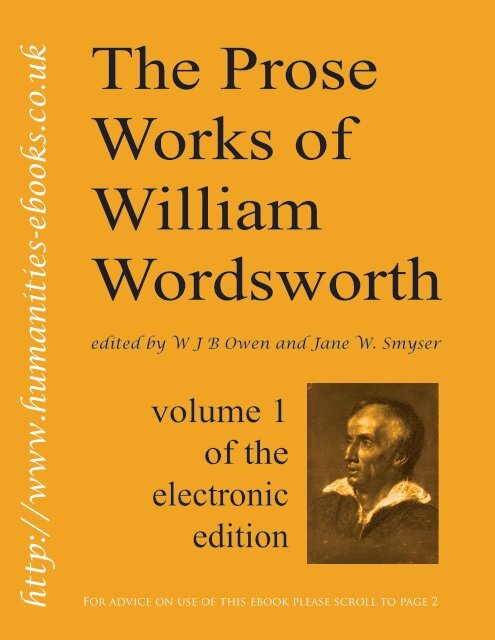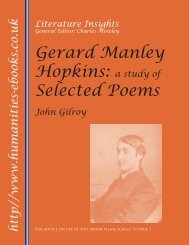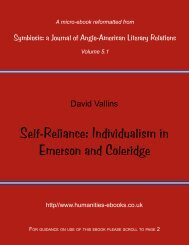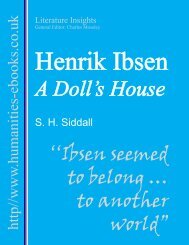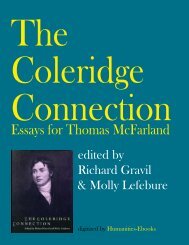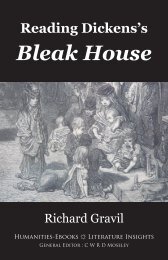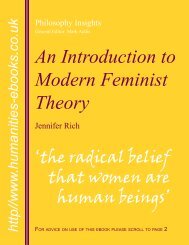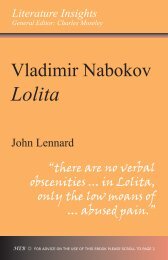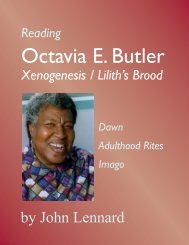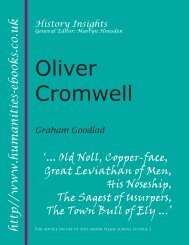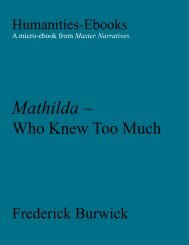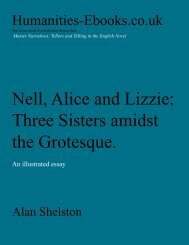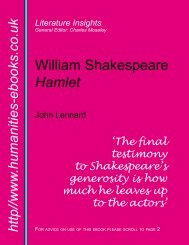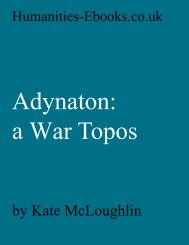The Prose Works of William Wordsworth - Humanities-Ebooks
The Prose Works of William Wordsworth - Humanities-Ebooks
The Prose Works of William Wordsworth - Humanities-Ebooks
You also want an ePaper? Increase the reach of your titles
YUMPU automatically turns print PDFs into web optimized ePapers that Google loves.
http://www.humanities-ebooks.co.uk<br />
<strong>The</strong> <strong>Prose</strong><br />
<strong>Works</strong> <strong>of</strong><br />
<strong>William</strong><br />
<strong>Wordsworth</strong><br />
edited by W J B Owen and Jane W. Smyser<br />
volume 1<br />
<strong>of</strong> the<br />
electronic<br />
edition<br />
For advice on use <strong>of</strong> this ebook please scroll to page 2
Publication Data<br />
© <strong>The</strong> Estate <strong>of</strong> W. J. B Owen, 2008<br />
First published in 1974 by the Clarendon Press, Oxford<br />
Published electronically in 2008 by <strong>Humanities</strong>-<strong>Ebooks</strong>, LLP<br />
Tirril Hall, Tirril, Penrith CA10 2JE<br />
<strong>The</strong> estate has asserted the right <strong>of</strong> W. J. B. Owen to be identified as the author <strong>of</strong> his<br />
work<br />
Reading Options<br />
* To use the navigation tools, the search facility, and other features <strong>of</strong> the viewer<br />
toolbar, this Ebook should be read in default view, using ‘fit page’.<br />
* To navigate through the contents use the hyperlinked ‘Bookmarks’ at the left <strong>of</strong><br />
the screen.<br />
* To search, expand the search column at the right <strong>of</strong> the screen or click on the appropriate<br />
symbol in the toolbar.<br />
* For ease <strong>of</strong> reading, use to enlarge the page to full screen [and <br />
to return to the full menu].<br />
* <strong>The</strong> symbol ► on each page <strong>of</strong> <strong>Wordsworth</strong>’s text is hyperlinked to the editorial<br />
commentary. <strong>The</strong> presence <strong>of</strong> such commentary is indicated by the symbol or by<br />
the line number being in colour. To return from the commentary to the text use the<br />
return or previous view button.<br />
Copyright and permissions<br />
Licence: this book is licensed to the purchaser for reading onscreen. You may also print a<br />
copy for personal reference, but please note that it is necessary to do this in a single operation.<br />
If you wish to use the work on a second computer please apply to the publisher<br />
by email. If experiencing any difficulty please contact richardgravil@hotmail.com.<br />
ISBN 978-1-84760-002-8
Contents<br />
Preface to the Electronic Edition<br />
Preface to the First Edition<br />
Table <strong>of</strong> Sigla and Abbreviations<br />
Abbreviations<br />
1. Early <strong>Prose</strong> Fragments<br />
INTRODUCTION: GENERAL<br />
INTRODUCTION: TEXTUAL<br />
EARLY PROSE FRAGMENTS: THE TEXT<br />
COMMENTARY<br />
2. A Letter to the Bishop <strong>of</strong> Llandaff<br />
INTRODUCTION: GENERAL<br />
INTRODUCTION: TEXTUAL<br />
LETTER TO THE BISHOP OF LLANDAFF: THE TEXT<br />
COMMENTARY<br />
3. Preface to <strong>The</strong> Borderers<br />
INTRODUCTION: GENERAL<br />
INTRODUCTION: TEXTUAL<br />
[PREFACE TO THE BORDERERS]<br />
COMMENTARY<br />
4. Conversations with Klopstock<br />
INTRODUCTION<br />
[CONVERSATIONS WITH KLOPSTOCK]<br />
COMMENTARY
5. Essay on Morals<br />
INTRODUCTION: GENERAL<br />
INTRODUCTION: TEXTUAL<br />
[ESSAY ON MORALS]<br />
COMMENTARY<br />
6. Advertisement, Preface and Appendix to Lyrical Ballads<br />
INTRODUCTION: GENERAL<br />
INTRODUCTION: TEXTUAL<br />
ADVERTISEMENT<br />
PREFACE [1800]<br />
PREFACE [1850]<br />
APPENDIX<br />
COMMENTARY: ADVERTISEMENT<br />
COMMENTARY: PREFACE<br />
ADDENDUM TO THE COMMENTARY: [Fragment on ‘transpositions’]<br />
COMMENTARY: APPENDIX<br />
7. <strong>The</strong> Convention <strong>of</strong> Cintra<br />
INTRODUCTION: GENERAL<br />
INTRODUCTION: TEXTUAL<br />
ADVERTISEMENT<br />
CONCERNING THE CONVENTION OF CINTRA<br />
[<strong>Wordsworth</strong>’s] APPENDICES<br />
EDITORIAL APPENDICES<br />
APPENDIX I : Address on <strong>The</strong> Convention <strong>of</strong> Cintra<br />
[ADDRESS ON THE CONVENTION OF CINTRA]<br />
APPENDIX II: Contents <strong>of</strong> the Cornell Manuscript <strong>of</strong> De Quincey’s ‘Postscript on<br />
Sir John Moore’s Letters’ (Healey Item 28O4)<br />
COMMENTARY: CINTRA<br />
COMMENTARY: APPENDIX
Preface to the Electronic Edition<br />
<strong>The</strong> establishment <strong>of</strong> <strong>Humanities</strong>-<strong>Ebooks</strong> makes it possible for a new generation <strong>of</strong><br />
scholars and readers to own this long unobtainable work, in a form that will have<br />
some conspicuous benefits, and enable new ways <strong>of</strong> discovering its virtues.<br />
As befits a monumental piece <strong>of</strong> scholarship, the editorial apparatus provided by<br />
Pr<strong>of</strong>essor Owen and Pr<strong>of</strong>essor Smyser has been retained, as indeed has the basic layout<br />
<strong>of</strong> the first edition, with its textual notes at the foot <strong>of</strong> each page <strong>of</strong> transcription,<br />
and separate editorial commentary on each <strong>of</strong> the twenty-one texts. <strong>The</strong> temptation<br />
to reduce the number <strong>of</strong> textual notes, and to eliminate some <strong>of</strong> the elaborate crossreferencing<br />
in the editorial apparatus has been resisted; it soon became apparent that<br />
while such changes might aid in the production <strong>of</strong> a stream-lined reading text, it<br />
would also require considerable, and unjustifiable, changes in the introductory matter<br />
and would remove from the work a dimension that, while few will be conscious <strong>of</strong> it,<br />
those few will marvel at. As in the printed edition it is possible to read the 1800 and<br />
1850 versions <strong>of</strong> the preface to Lyrical Ballads as parallel texts: in this case, however,<br />
the choice is for the reader to make: the pagination <strong>of</strong> the whole allows for side<br />
by side display <strong>of</strong> the two texts, using the appropriate screen layout.<br />
<strong>The</strong> benefits <strong>of</strong> electronic processing will appear mainly in the following respects.<br />
First, the entire text is searchable. Second, the presence <strong>of</strong> editorial commentary is<br />
indicated by the symbol in the margin, or by the line number being in that colour.<br />
Third, the appropriate page <strong>of</strong> the editors’ commentary can be accessed from the<br />
text via a hyperlinked button ► in the margin. Fourth, the table <strong>of</strong> contents is itself<br />
hyperlinked, and is duplicated in the form <strong>of</strong> hyperlinked bookmarks at the left <strong>of</strong> the<br />
screen, enabling instant navigation between the 21 separate ‘texts’ and, in each case,<br />
the general introduction, textual introduction, text, appendices (where applicable)<br />
and editorial commentary. Fifth, the use <strong>of</strong> colour, for interlinear emendations, and<br />
the separate lineation <strong>of</strong> columnized textual notes is designed to make these features<br />
<strong>of</strong> the editorial apparatus clearer and easier to construe than in the first edition.<br />
<strong>The</strong> index <strong>of</strong> the original edition will, as in the printed version, appear in Volume<br />
3, but in abbreviated form. <strong>The</strong> search facility in an electronic book makes the listing
<strong>The</strong> <strong>Prose</strong> <strong>Works</strong> <strong>of</strong> <strong>William</strong> <strong>Wordsworth</strong><br />
<br />
<strong>of</strong> page numbers for proper names (and names <strong>of</strong> works) redundant. All such numerical<br />
entries (though not, <strong>of</strong> course, the names themselves) have been deleted. <strong>The</strong><br />
inclusion <strong>of</strong> numbers only for conceptual entries in the index will result in a much<br />
shorter index, which will be––in consequence––easier to search.<br />
Very minor amendments have been made to the content. A fragmentary essay has<br />
been separated from the Commentary to the Preface to Lyrical Ballads, as an Addendum<br />
to the Commentary <strong>of</strong> Text 6. Some particularly important passages in Greek<br />
and Latin have been translated and some cross-references to Volumes 2 and 3 expanded.<br />
<strong>The</strong> Fenwick Notes have not been included, however, despite the reasonable<br />
suggestion <strong>of</strong> some reviewers <strong>of</strong> the printed edition that they might have been. <strong>The</strong>se<br />
are already available from <strong>Humanities</strong>-<strong>Ebooks</strong> in a companion edition corrected and<br />
revised by Jared Curtis (2007).<br />
In 1989 John O Hayden published a very short article entitled, ‘Substantive Errors<br />
in the Standard edition <strong>of</strong> <strong>Wordsworth</strong>’s <strong>Prose</strong>’, <strong>The</strong> Library: Transactions <strong>of</strong><br />
the Bibliographical Society, sixth series 11:1 (1989) 58–9. <strong>The</strong> eleven errors listed—based<br />
upon examination <strong>of</strong> the MS or printed source text—included one which<br />
bears heavily upon the meaning <strong>of</strong> the text, the rest being <strong>of</strong> the order <strong>of</strong> a changed<br />
preposition, an intruded quotation mark, a missed gap in the MS, and so on. <strong>The</strong>se<br />
will be corrected in this edition, with due acknowledgement <strong>of</strong> Pr<strong>of</strong>essor Hayden’s<br />
notations interpolated into the commentary.<br />
It is not unlikely, however, that as a result <strong>of</strong> the scanning process many more errors<br />
have been introduced than have been eliminated, despite attempts to replicate the<br />
exemplary care Pr<strong>of</strong>essors Owen and Smyser took with the printed edition. As this is<br />
an electronic edition, however, there is a ready-and-easy way to rectify such errors.<br />
Suggestions for correction and improvement will be most welcome and will be acted<br />
upon as soon as practicable. It is proposed to publish a corrected edition <strong>of</strong> this work<br />
on the first day <strong>of</strong> 2010, and to incorporate any feedback regarding inadvertent errors.<br />
Purchasers <strong>of</strong> the work will be entitled to the update.<br />
I am grateful, for varieties <strong>of</strong> help, to John Beer, Jeff Cowton, Michael John Kooy,<br />
Sam Ward, and Averill Buchanan. <strong>The</strong> latter’s exemplary scanning and correction <strong>of</strong><br />
the Cintra text bodes well for Volume 3, to which she was the major contributor.<br />
One paid contributor to Volume 1 <strong>of</strong> this project appears to have typed rather than scanned his<br />
portion, introducing many modern spellings and other unconscious errors, leaving out several lines at a<br />
time, and repeating others. This necessitated up to twenty corrections per page, and the renumbering<br />
<strong>of</strong> text, textual notes and commentary, caused considerable delays.
Preface to the First Edition<br />
WHEN, at the suggestion <strong>of</strong> Helen Darbishire, we agreed to collaborate in editing<br />
<strong>Wordsworth</strong>’s prose, we decided that each particular work should be assigned to one<br />
or the other <strong>of</strong> us, rather than that both should give full attention to every work. At<br />
the outset, however, we found that by coincidence we each had independently edited<br />
<strong>Wordsworth</strong>’s three Essays upon Epitaphs. We amalgamated this initial work and<br />
so stand jointly responsible for the editing <strong>of</strong> these three essays (<strong>Prose</strong> <strong>Works</strong>, IX).<br />
For the rest, Pr<strong>of</strong>essor Owen has edited I, III–VIII, XI–XVI, and Pr<strong>of</strong>essor Smyser,<br />
II, X, XVII–XXI. Despite this division <strong>of</strong> labour and final responsibility, the editing<br />
throughout has been closely and happily collaborative.<br />
Our aim has been to publish a complete edition <strong>of</strong> <strong>Wordsworth</strong>’s prose works with<br />
an apparatus <strong>of</strong> all verbal variants. By definition such an edition includes all extant<br />
versions <strong>of</strong> prose works either published or written with the intent <strong>of</strong> publication.<br />
From a distance the boundaries <strong>of</strong> the domain are distinctly recognized, but close at<br />
hand they are discerned under a trickier light and finally some arbitrary decisions are<br />
called for. We have included prose fragments written by <strong>Wordsworth</strong> in his youth ;<br />
when he put them on paper, he may or may not have thought <strong>of</strong> developing them into<br />
publishable prose. On the other hand, we have excluded two extensive sets <strong>of</strong> prose<br />
notes attached to poems: notes published and republished by <strong>Wordsworth</strong> in numerous<br />
volumes <strong>of</strong> poetry, and notes dictated by him to Isabella Fenwick in 1842–3.<br />
With one exception, both sets <strong>of</strong> notes are now available where they are most useful<br />
and most desirable—in <strong>The</strong> Poetical <strong>Works</strong> <strong>of</strong> <strong>William</strong> <strong>Wordsworth</strong>, edited by E.<br />
de Selincourt and Helen Darbishire (Oxford, 1940–9). <strong>The</strong> one exception is <strong>Wordsworth</strong>’s<br />
brief note to ‘<strong>The</strong> Ancient Mariner’, first published in the Lyrical Ballads <strong>of</strong><br />
1800 and frequently reprinted. But despite the availability <strong>of</strong> <strong>Wordsworth</strong>’s notes, the<br />
decision to bar all <strong>of</strong> them from this edition was a difficult one, and particularly so for<br />
his Memoir <strong>of</strong> the Rev. Robert Walker (P.W. iii. 510–22). Because <strong>of</strong> its length and<br />
This reference remains, at present, to the Clarendon Press edition, as with all cross-references<br />
to volumes 2 and 3 [RG]..
<strong>The</strong> <strong>Prose</strong> <strong>Works</strong> <strong>of</strong> <strong>William</strong> <strong>Wordsworth</strong><br />
<br />
because <strong>of</strong> its connection with An Unpublished Tour, a prose work now published<br />
for the first time, it might be maintained that the Memoir should be included in this<br />
edition. But we have held fast to our principle <strong>of</strong> not republishing notes to poems.<br />
Had we made an exception <strong>of</strong> the Memoir, we would have been hard pressed to find<br />
grounds for excluding other long notes to the poetry. For similar reasons we have not<br />
attempted to include in this edition <strong>Wordsworth</strong>’s marginalia.<br />
Another omission is far from intentional. In May 1838, in a letter to Daniel Stuart,<br />
formerly the editor <strong>of</strong> the Courier, <strong>Wordsworth</strong> listed poems and prose contributions<br />
which he had published in several journals; among them was ‘one article which I<br />
was induced to publish in a London newspaper, when Southey and Byron were at<br />
war’ (L.Y., p. 942). An extensive search has so far failed to uncover for us this lost<br />
article. All that we have found is a corroborating allusion in the Literary Gazette <strong>of</strong><br />
19 January 1822; before reprinting in full Southey’s letter <strong>of</strong> 11 January to the Courier,<br />
the Gazette gives a burlesque account <strong>of</strong> the ‘fight’ between Southey and Byron<br />
and lists, among a series <strong>of</strong> episodes, an intervention by the ‘Leach-gatherer’. No<br />
details <strong>of</strong> place or date are given. Alert to possibilities <strong>of</strong> other uncollected prose, we<br />
have, nevertheless, not systematically sought for a mysterious essay once mentioned<br />
by Hazlitt. In the course <strong>of</strong> praising Burke’s prose style, Hazlitt made an aside: ‘I<br />
remember Coleridge assuring me … that <strong>Wordsworth</strong> had written an Essay on Marriage,<br />
which, for manly thought and nervous expression, he deemed incomparably<br />
superior’ (<strong>The</strong> Complete <strong>Works</strong> <strong>of</strong> <strong>William</strong> Hazlitt, ed. P. P. Howe (London, 1931),<br />
xii. 228). We have met no other reference to such an essay and rather suspect that, if<br />
Hazlitt’s recollection is accurate, Coleridge was swelling the corpus <strong>of</strong> <strong>Wordsworth</strong>’s<br />
writing, as he sometimes swelled his own.<br />
<strong>The</strong> texts <strong>of</strong> our edition, whether <strong>of</strong> works published by <strong>Wordsworth</strong> or <strong>of</strong> works<br />
left unpublished in manuscript, are, with one exception, the last to have been corrected<br />
by him. <strong>The</strong> exception is the Preface to Lyrical Ballads, which is here published in two<br />
versions on facing pages, the first edition <strong>of</strong> 1800 and the last edition <strong>of</strong> 1850. Throughout<br />
the whole <strong>of</strong> our edition, variants, both from manuscripts and earlier editions, are<br />
preserved in textual notes and occasionally in longer appendices. <strong>The</strong> last versions to<br />
be corrected by <strong>Wordsworth</strong> have been adopted as the main texts not only because <strong>of</strong><br />
the great importance which he attached ‘to following strictly the last Copy <strong>of</strong> the text<br />
<strong>of</strong> an Author’ (L.Y., p. 473), but also because <strong>of</strong> the kinds <strong>of</strong> revisions that are peculiar<br />
to his prose. In the case <strong>of</strong> unpublished manuscripts, the last corrected version provides<br />
In this electronic edition the decision whether to display the pages side by side or alternately is<br />
for the reader to make: the viewing toolbar allows for both [RG].
<strong>The</strong> <strong>Prose</strong> <strong>Works</strong> <strong>of</strong> <strong>William</strong> <strong>Wordsworth</strong><br />
<br />
almost invariably the only coherent and clearly intelligible text, for earlier versions are<br />
little more than fragmentary rough drafts, with numerous deletions and rewritings. In<br />
the case <strong>of</strong> published works, with the exception just mentioned, <strong>Wordsworth</strong> did not<br />
alter the main arguments <strong>of</strong> his prose or contradict the original spirit and intent. He<br />
merely corrected misprints and factual errors, made stylistic improvements, clarified<br />
ambiguous statements, and expanded earlier texts or added new sections. (On the rare<br />
occasions when an error was introduced into the final text, we relegate it to the textual<br />
apparatus and print instead the most recent correct version.)<br />
In separate introductions we describe in detail not only the various manuscripts<br />
but also any departures from our standard procedure in editing them. Here it is only<br />
necessary to set forth briefly a few <strong>of</strong> the principles governing our editorial practice:<br />
we preserve the manuscript spellings and abbreviations, with all their inconsistencies;<br />
where the manuscript lacks pointing, we silently insert it for the sake <strong>of</strong> intelligibility,<br />
but wherever we alter a mark <strong>of</strong> punctuation, we record that alteration in a textual<br />
note; although we have endeavoured to preserve all deletions, we have not recorded<br />
the striking out and the immediate rewriting <strong>of</strong> identical words and phrases; we have<br />
also not recorded transpositions within a sentence <strong>of</strong> identical words, phrases, and<br />
clauses, and only rarely have we recorded the fact that some <strong>of</strong> the text was inserted,<br />
usually by means <strong>of</strong> a caret, at the very moment <strong>of</strong> composition. A table <strong>of</strong> sigla used<br />
in the textual notes will be found on p. 11.<br />
Our general introductions are concerned primarily with defining the date, occasion,<br />
and background <strong>of</strong> the particular work, and we have usually refrained from<br />
comment on its literary qualities. In our commentaries where we quote or cite the<br />
poetry <strong>of</strong> any major English poet without referring to a specific edition, we are using<br />
the edition <strong>of</strong> his work in the series known as the Oxford Standard Authors. Otherwise,<br />
works frequently cited are identified in the list <strong>of</strong> abbreviations.<br />
For permission to publish manuscripts <strong>of</strong> <strong>Wordsworth</strong>’s prose and other related<br />
manuscripts, we are indebted to the <strong>Wordsworth</strong> Library in Grasmere, the British<br />
Museum, the Victoria and Albert Museum, the Pierpont Morgan Library, the Cornell<br />
University Library, Harvard University Library, Northwestern University Library,<br />
and Yale University Library. <strong>The</strong> specific manuscripts <strong>of</strong> these libraries are all identified<br />
and described in subsequent introductions appropriate to them. But it should<br />
be added here that the numbering <strong>of</strong> the manuscripts in the <strong>Wordsworth</strong> Library at<br />
Grasmere, both those which we edit and those to which we briefly refer, is what will<br />
some day, no doubt, be called ‘Old Style’. New numbers were assigned to all the<br />
manuscripts after this edition had gone into page pro<strong>of</strong>, but scholars seeking to ex-
<strong>The</strong> <strong>Prose</strong> <strong>Works</strong> <strong>of</strong> <strong>William</strong> <strong>Wordsworth</strong> 10<br />
amine the manuscripts at Grasmere will find there a table <strong>of</strong> correspondences for the<br />
old and new numbering.<br />
Pr<strong>of</strong>essor Owen’s research has been generously supported by the <strong>Humanities</strong><br />
Research Council <strong>of</strong> Canada, the Canada Council, and McMaster University, and<br />
Pr<strong>of</strong>essor Smyser’s by a grant from the American Council <strong>of</strong> Learned Societies and<br />
frequent research grants from Connecticut College.<br />
We are also grateful to many scholars and friends who have assisted us in numerous<br />
ways and it is pleasant here to express our gratitude to them. Helen Darbishire comes<br />
first to mind for she welcomed us to Grasmere and aided us at the very beginning <strong>of</strong><br />
this undertaking; her wisdom and generosity are unforgettable. <strong>The</strong> loyal support <strong>of</strong><br />
Pr<strong>of</strong>essor Basil Willey, as chairman <strong>of</strong> the Dove Cottage Trustees, has, over a long period<br />
<strong>of</strong> time, been invaluable; indeed, he and his fellow Trustees have made this edition<br />
possible. At Grasmere too we have found in the librarians allies par excellence: first,<br />
Miss Phoebe Johnson and later and for a longer time, Miss Nesta Clutterbuck. To them<br />
especially, but also to Dr. Stephen Gill, whose librarianship more briefly overlapped<br />
our days <strong>of</strong> research, we are deeply grateful. By their admirable publications Pr<strong>of</strong>essor<br />
Zera S. Fink, the late Pr<strong>of</strong>essor George H. Healey, Mr. Alan G. Hill, Mrs. Mary Moorman,<br />
Pr<strong>of</strong>essor Mark L. Reed, and Pr<strong>of</strong>essor Chester L. Shaver have advanced the<br />
work <strong>of</strong> all <strong>Wordsworth</strong> scholars; in addition they have personally assisted us in prompt<br />
and generous ways, which are greatly appreciated. At the Cornell University Library<br />
Pr<strong>of</strong>essor Donald D. Eddy continues the cordial traditions <strong>of</strong> George Healey and we<br />
acknowledge with thanks his many kindnesses. For generous aid <strong>of</strong> various kinds we<br />
are also indebted to Miss Helen K. Aitner, Connecticut College Library; the Revd.<br />
T. E. H. Baily, Shap; Dr. Paul F. Betz, Georgetown University; Dr. F. W. Bradbrook,<br />
University College <strong>of</strong> North Wales; Dr. Elizabeth M. Brennan, Westfield College, University<br />
<strong>of</strong> London; Pr<strong>of</strong>essor A. D. Fitton Brown, University <strong>of</strong> Leicester; Pr<strong>of</strong>essor M.<br />
L. Clarke, University College <strong>of</strong> North Wales; Miss Martha A. Connor, Swarthmore<br />
College Library; the late Pr<strong>of</strong>essor John F. Danby, University College <strong>of</strong> North Wales;<br />
Miss Vera Farnell, Grasmere; Mrs. Sylvia Harris, Ambleside; the late Mrs. Beatrix<br />
Hogan; Mr. Wilmarth Lewis, Farmington, Connecticut; Mr. J. R. T. Pollard, University<br />
College <strong>of</strong> North Wales; Pr<strong>of</strong>essor Frederick A. Pottle, Yale University; Pr<strong>of</strong>essor T. M.<br />
Raysor, University <strong>of</strong> Nebraska; Mr. Kenneth Smith, Tullie House Library; Mr. J. H.<br />
Watkins, University College <strong>of</strong> North Wales; Dr. George J. Willauer, Jr., Connecticut<br />
College; Miss Marjorie G. Wynne, Yale University Library.<br />
Finally, to Betty Owen and Hamilton Smyser, our shadow collaborators in countless<br />
ways, we give our heartfelt thanks. One particularly generous contribution <strong>of</strong>
<strong>The</strong> <strong>Prose</strong> <strong>Works</strong> <strong>of</strong> <strong>William</strong> <strong>Wordsworth</strong> 11<br />
Betty Owen’s must, however, be permitted to emerge into full light: she compiled for<br />
us a file <strong>of</strong> all proper names and all place-names that are now entered in our Index. If<br />
there are errors there, they are, like errors elsewhere in this work, ours.<br />
W. J. B. OWEN,<br />
McMaster University<br />
JANE WORTHINGTON SMYSER,<br />
Connecticut College
Table <strong>of</strong> Sigla and Abbreviations<br />
as used in the textual notes<br />
MS.<br />
the first version in the manuscript<br />
MS. 2 the second version or first correction<br />
MS. 3 the third version or first correction<br />
A 2 the second version or first correction <strong>of</strong> MS. A.<br />
[ ] a blank space in the manuscript<br />
[?] an illegible letter or letters, or an illegible word or words<br />
[? there] the word may be there<br />
[? there or their] the word is either there or their<br />
[there] an editorial interpolation<br />
273/4 occurring between lines 273 and 274<br />
corr. corrected<br />
del.<br />
deleted<br />
ins.<br />
inserted<br />
om.<br />
omitted<br />
subs. substituted<br />
A sample note:<br />
there 1822: their MS.: here MS. 2 , 1810–20.<br />
<strong>The</strong> first occurrence <strong>of</strong> there is in the edition <strong>of</strong> 1822; the first version <strong>of</strong> the manuscript<br />
reads their (we avoid the use <strong>of</strong> sic); the second version <strong>of</strong> the manuscript and<br />
the editions <strong>of</strong> 1810 to 1820 read here.
Abbreviations<br />
Abrams M. H. Abrams, <strong>The</strong> Mirror and the Lamp (New York, 1953)<br />
Ad. Cintra Advertisement to Concerning … the Convention <strong>of</strong> Cintra<br />
Addison, Spectator Joseph Addison, <strong>The</strong> Spectator, ed. D. F. Bond (Oxford, 1965)<br />
Address<br />
[Address on the Convention <strong>of</strong> Cintra]<br />
Ad. L.B. Advertisement to Lyrical Ballads (1798)<br />
Ap. Cintra Appendix to Concerning … the Convention <strong>of</strong> Cintra<br />
Ap. L.B.<br />
Appendix to Lyrical Ballads (1802, etc.)<br />
Autobiog.<br />
Autobiographical Memoranda<br />
Barstow<br />
Marjorie L. Barstow, <strong>Wordsworth</strong>’s <strong>The</strong>ory <strong>of</strong> Poetic Diction<br />
(New Haven, Conn., 1917)<br />
Biog. Lit.<br />
S. T. Coleridge, Biographia Literaria, ed. J. Shawcross (Oxford,<br />
1907)<br />
Blair<br />
Hugh Blair, Lectures on Rhetoric and Belles Lettres (Edinburgh,<br />
1813; first edition, 1783)<br />
Bord.<br />
<strong>The</strong> Borderers<br />
Bowness<br />
Speech at the Laying <strong>of</strong> the Foundation Stone <strong>of</strong> the New School<br />
in the Village <strong>of</strong> Bowness, Windermere<br />
[Burke,] Enquiry Edmund Burke, A Philosophical Enquiry into the Origin <strong>of</strong> our<br />
Ideas <strong>of</strong> the Sublime and Beautiful, ed. J. T. Boulton (London,<br />
1958)<br />
[Burke,] Reflections Edmund Burke, Reflections on the Revolution in France, in<br />
<strong>Works</strong> (Bohn’s Standard Library, London, 1886)<br />
Burns<br />
Letter to a Friend <strong>of</strong> Robert Burns<br />
Chiabrera, Opere Gabriello Chiabrera, Delle Opere di Gabbriello Chiabrera Tomo<br />
Secondo (Venice, 1782)<br />
Cintra<br />
Concerning … <strong>The</strong> Convention <strong>of</strong> Cintra<br />
C.L.<br />
Collected Letters <strong>of</strong> Samuel Taylor Coleridge, ed. Earl Leslie<br />
Griggs (Oxford, 1956-71)<br />
Clarke<br />
James Clarke, A Survey <strong>of</strong> the Lakes <strong>of</strong> Cumberland, Westmorland,<br />
and Lancashire, second edition (London, 1789)
<strong>The</strong> <strong>Prose</strong> <strong>Works</strong> <strong>of</strong> <strong>William</strong> <strong>Wordsworth</strong> 14<br />
C.N.B.<br />
<strong>The</strong> Notebooks <strong>of</strong> Samuel Taylor Coleridge, ed. Kathleen Coburn<br />
(New York, 1957– )<br />
Copyright <strong>The</strong> Law <strong>of</strong> Copyright<br />
C.R.<br />
<strong>The</strong> Correspondence <strong>of</strong> Henry Crabb Robinson with the <strong>Wordsworth</strong><br />
Circle, ed. Edith J. Morley (Oxford, 1927)<br />
Delille<br />
Jacques Delille, Discours préliminaire to his translation <strong>of</strong> the<br />
Georgics, in Oeuvres, ii (Paris, 1824; first edition, 1770)<br />
Dennis<br />
Critical <strong>Works</strong> <strong>of</strong> John Dennis, ed. E. N. Hooker (Baltimore,<br />
Md., 1939–43)<br />
D.N.B<br />
Dictionary <strong>of</strong> National Biography<br />
[Dryden,] Essays Essays <strong>of</strong> John Dryden, ed. W. P. Ker (Oxford, 1900)<br />
Duff <strong>William</strong> Duff, Essay on Original Genius (London, 1767)<br />
E. de S. <strong>Wordsworth</strong>’s Guide to the Lakes, ed. Ernest de Selincourt (London,<br />
1906)<br />
E.E.<br />
Essays upon Epitaphs<br />
Elegant Extracts Elegant Extracts; or useful and entertaining Pieces <strong>of</strong> Poetry …,<br />
ed. Vicesimus Knox (London, 1805)<br />
E.S.<br />
Essay, Supplementary to the Preface<br />
Exc. <strong>The</strong> Excursion, in P.W. v.<br />
E.Y.<br />
<strong>The</strong> Letters <strong>of</strong> <strong>William</strong> and Dorothy <strong>Wordsworth</strong>: <strong>The</strong> Early Years,<br />
1787–1806, ed. Ernest de Selincourt; second edition, revised by<br />
Chester L. Shaver (Oxford, 1967)<br />
Fenwick note I. F. note (see below)<br />
Fink Z. S. Fink, <strong>The</strong> Early <strong>Wordsworth</strong>ian Milieu (Oxford, 1958)<br />
Fragments Early <strong>Prose</strong> Fragments<br />
Freeholders Two Addresses to the Freeholders <strong>of</strong> Westmorland<br />
Gerard, Genius Alexander Gerard, Essay on Genius (London, 1774)<br />
Gerard, Taste Alexander Gerard, Essay on Taste (London, 1759)<br />
Gilbert<br />
A. H. Gilbert, Literary Criticism: Plato to Dryden (New York,<br />
1940)<br />
Gilpin<br />
<strong>William</strong> Gilpin, Observations Relative Chiefly to Picturesque<br />
Beauty … Particularly the Mountains, and Lakes <strong>of</strong> Cumberland,<br />
and Westmoreland, second edition (London, 1788)<br />
Godwin <strong>William</strong> Godwin, Enquiry concerning Political Justice, ed. F. E.<br />
L. Priestley (Toronto, 1946)
<strong>The</strong> <strong>Prose</strong> <strong>Works</strong> <strong>of</strong> <strong>William</strong> <strong>Wordsworth</strong> 15<br />
Green<br />
<strong>William</strong> Green, <strong>The</strong> Tourist’s New Guide, Containing A Description<br />
<strong>of</strong> the Lakes, Mountains, and Scenery in Cumberland, Westmorland,<br />
and Lancashire (Kendal, 1819)<br />
Grosart<br />
<strong>The</strong> <strong>Prose</strong> <strong>Works</strong> <strong>of</strong> <strong>William</strong> <strong>Wordsworth</strong>, ed. Alexander B. Grosart<br />
(London, 1876)<br />
Guide<br />
A Guide through the District <strong>of</strong> the Lakes in the North <strong>of</strong> England<br />
G.W.<br />
Gordon <strong>Wordsworth</strong>’s transcript <strong>of</strong> Guide manuscripts in the<br />
<strong>Wordsworth</strong> Library<br />
Hale White W. Hale White, Description <strong>of</strong> the <strong>Wordsworth</strong> and Coleridge<br />
Manuscripts in the Possession <strong>of</strong> Mr. T. Norton Longman (London,<br />
1897)<br />
Hartley<br />
Joseph Priestley, Hartley’s <strong>The</strong>ory <strong>of</strong> the Human Mind (London,<br />
1775)<br />
Havens R. D. Havens, <strong>The</strong> Mind <strong>of</strong> a Poet (Baltimore, Md., 1941)<br />
H.C.R. Henry Crabb Robinson on Books and their Writers, ed. Edith J.<br />
Morley (London, 1938)<br />
Healey<br />
George Harris Healey, <strong>The</strong> Cornell <strong>Wordsworth</strong> Collection (Ithaca,<br />
N.Y., 1957)<br />
Hutchinson, W[illiam] Hutchinson, An Excursion to the Lakes in Westmoreland<br />
and Cumberland … (London, 1776)<br />
Excursion<br />
Hutchinson, History <strong>William</strong> Hutchinson, <strong>The</strong> History <strong>of</strong> the County <strong>of</strong> Cumberland<br />
(Carlisle, 1794)<br />
I.F. note<br />
Notes dictated by <strong>Wordsworth</strong> to Isabella Fenwick in 1843 and<br />
printed in P.W.<br />
J.E.G.P.<br />
Journal <strong>of</strong> English and Germanic Philology<br />
[Johnson,] Lives Samuel Johnson, Lives <strong>of</strong> the English Poets, ed. George Birkbeck<br />
Hill (Oxford, 1905)<br />
Jordan<br />
John E. Jordan, De Quincey to <strong>Wordsworth</strong> (Berkeley and Los<br />
Angeles, CA., 1962)<br />
Journals<br />
Journals <strong>of</strong> Dorothy <strong>Wordsworth</strong>, ed. Ernest de Selincourt (London,<br />
1941)<br />
Kames<br />
Henry Home, Lord Kames, Elements <strong>of</strong> Criticism, fifth edition<br />
(Edinburgh, 1774)<br />
Klopstock<br />
Conversations with Klopstock<br />
Knight, <strong>Prose</strong> <strong>Works</strong> <strong>The</strong> <strong>Prose</strong> <strong>Works</strong> <strong>of</strong> <strong>William</strong> <strong>Wordsworth</strong>, ed. <strong>William</strong> Knight<br />
(London, 1896)
<strong>The</strong> <strong>Prose</strong> <strong>Works</strong> <strong>of</strong> <strong>William</strong> <strong>Wordsworth</strong> 16<br />
L.B. Lyrical Ballads (1798, 1800, 1802, 1805)<br />
Llandaff<br />
A Letter to the Bishop <strong>of</strong> Llandaff …<br />
Lovejoy<br />
A. O. Lovejoy, Essays in the History <strong>of</strong> Ideas (Baltimore, Md.,<br />
1948)<br />
L.Y.<br />
<strong>The</strong> Letters <strong>of</strong> <strong>William</strong> and Dorothy <strong>Wordsworth</strong>: <strong>The</strong> Later Years,<br />
ed. Ernest de Selincourt (Oxford, 1939)<br />
Mathetes<br />
Letter <strong>of</strong> ‘Mathetes’ (John Wilson) to <strong>The</strong> Friend<br />
M.L.N.<br />
Modern Language Notes<br />
M.L.R.<br />
Modern Language Review<br />
Moorman, i. Mary Moorman, <strong>William</strong> <strong>Wordsworth</strong>, a Biography: <strong>The</strong> Early<br />
Years, 1770–1803 (Oxford, 1957)<br />
Moorman, ii. Mary Moorman, <strong>William</strong> <strong>Wordsworth</strong>, a Biography: <strong>The</strong> Later<br />
Years, 1803–1850 (Oxford, 1965)<br />
Morals<br />
Essay on Morals<br />
M.P.<br />
Modern Philology<br />
M.W., Letters Letters <strong>of</strong> Mary <strong>Wordsworth</strong>, ed. Mary E. Burton (Oxford, 1958)<br />
M.Y.<br />
Letters <strong>of</strong> <strong>William</strong> and Dorothy <strong>Wordsworth</strong>: <strong>The</strong> Middle Years,<br />
ed. Ernest de Selincourt; second edition, revised by Mary Moorman<br />
and Alan G. Hill (Oxford, 1969–70)<br />
N.&Q.<br />
Notes and Queries<br />
Nat. Ind. and Lib. Poems Dedicated to National Independence and Liberty in P.W.<br />
iii<br />
Nicolson and Burn Joseph Nicolson and Richard Burn, <strong>The</strong> History and Antiquities <strong>of</strong><br />
the Counties <strong>of</strong> Westmorland and Cumberland (London, 1777)<br />
O.E.D.<br />
Oxford English Dictionary<br />
Oman Charles Oman, History <strong>of</strong> the Peninsular War (Oxford, 1902,<br />
etc.)<br />
Owen<br />
<strong>Wordsworth</strong>’s Preface to ‘Lyrical Ballads’, ed. W. J. B. Owen<br />
(Copenhagen, 1957)<br />
P. 1815 Preface to the Edition <strong>of</strong> 1815<br />
[Paine,] Common<br />
Sense<br />
Common Sense, in <strong>The</strong> Writings <strong>of</strong> Thomas Paine, ed. M. D. Conway<br />
(New York, 1906)<br />
[Paine,] Rights <strong>of</strong><br />
Man<br />
Rights <strong>of</strong> Man, in <strong>The</strong> Writings <strong>of</strong> Thomas Paine, ed. M. D. Conway<br />
(New York, 1906)<br />
P. Bord. Preface to <strong>The</strong> Borderers<br />
Petition<br />
<strong>Wordsworth</strong>’s Petition in Appendix to the Reports <strong>of</strong> the Select<br />
Committee … on Public Petitions, Session 1839
<strong>The</strong> <strong>Prose</strong> <strong>Works</strong> <strong>of</strong> <strong>William</strong> <strong>Wordsworth</strong> 17<br />
P. Exc. Preface to <strong>The</strong> Excursion<br />
P.L.B.<br />
Preface to Lyrical Ballads<br />
PMLA<br />
Publications <strong>of</strong> the Modern Language Association <strong>of</strong> America<br />
Postscript Postscript to Yarrow Revisited and Other Poems<br />
Prel.<br />
<strong>The</strong> Prelude, ed. Ernest de Selincourt; second edition, revised by<br />
Helen Darbishire (Oxford, 1959). <strong>The</strong> text <strong>of</strong> 1805 is cited unless<br />
otherwise stated.<br />
Priestley, Oratory Joseph Priestley, A Course <strong>of</strong> Lectures on Oratory and Criticism<br />
(London, 1775)<br />
P.W.<br />
Poetical <strong>Works</strong> <strong>of</strong> <strong>William</strong> <strong>Wordsworth</strong>, ed. Ernest de Selincourt<br />
and Helen Darbishire (Oxford, 1940–9, and revised issues,<br />
1952–9)<br />
Q.R.<br />
Quarterly Review<br />
Railway<br />
Kendal and Windermere Railway<br />
Recl.<br />
<strong>The</strong> Recluse, in P.W. v<br />
Reed<br />
Mark L. Reed, <strong>Wordsworth</strong>: the Chronology <strong>of</strong> the Early Tears<br />
(Cambridge, Mass., 1967)<br />
R.E.L.<br />
Review <strong>of</strong> English Literature<br />
Report<br />
Report from His Majesty’s Commissioners for Inquiring into the<br />
Administration and Practical Operation <strong>of</strong> the Poor Laws (London,<br />
[1834])<br />
R.E.S.<br />
Review <strong>of</strong> English Studies<br />
Reynolds Sir Joshua Reynolds, <strong>Works</strong> (London, 1798)<br />
R.M.<br />
[Reply to ‘Mathetes’]<br />
Rousseau<br />
Du Contrat social, in <strong>The</strong> Political Writings <strong>of</strong> Jean Jacques Rousseau,<br />
ed. C. E. Vaughan (Cambridge, 1915)<br />
Rydal Mount Catalogue <strong>of</strong> the Varied and Valuable Historical, Poetical, <strong>The</strong>ological,<br />
and Miscellaneous Library <strong>of</strong> the late venerated Poet-<br />
Catalogue<br />
laureate, <strong>William</strong> <strong>Wordsworth</strong> … (Preston, 1859); reprinted in<br />
Transactions <strong>of</strong> the <strong>Wordsworth</strong> Society, No. VI, pp. [195]–257<br />
(Edinburgh, n.d.)<br />
S.C.<br />
S. T. Coleridge, Shakespearean Criticism, ed. T. M. Raysor (London,<br />
1960)<br />
Scafell Pike Dorothy <strong>Wordsworth</strong>, Scafell Pike Excursion<br />
Excursion<br />
S.H., Letters<br />
<strong>The</strong> Letters <strong>of</strong> Sara Hutchinson, ed. Kathleen Coburn (London,<br />
1954)
<strong>The</strong> <strong>Prose</strong> <strong>Works</strong> <strong>of</strong> <strong>William</strong> <strong>Wordsworth</strong> 18<br />
Smith<br />
Elsie Smith, An Estimate <strong>of</strong> <strong>William</strong> <strong>Wordsworth</strong> by his Contemporaries<br />
(Oxford, 1932)<br />
[Southey,] Life and C. C. Southey, Life and Correspondence <strong>of</strong> Robert Southey (London,<br />
1849, etc.)<br />
Correspondence<br />
[Southey,] J. W. Warter, Selections from the Letters <strong>of</strong> Robert Southey (London,<br />
1856)<br />
Selections<br />
Stewart<br />
Dugald Stewart, Elements <strong>of</strong> the Philosophy <strong>of</strong> the Human Mind<br />
(London, 1792)<br />
Subl. and Beaut. <strong>The</strong> Sublime and the Beautiful<br />
S.V.<br />
Select Views<br />
Talfourd, Three T. N. Talfourd, Three Speeches … In Favour <strong>of</strong> a Measure for An<br />
Speeches<br />
Extension <strong>of</strong> Copyright (London, 1840)<br />
T.L.S.<br />
Times Literary Supplement<br />
Ullswater Excursion Dorothy <strong>Wordsworth</strong>, Ullswater Excursion<br />
U.T.<br />
An Unpublished Tour<br />
U.T.Q.<br />
University <strong>of</strong> Toronto Quarterly<br />
[Watson,] Appendix R[ichard] Watson, A Sermon Preached Before <strong>The</strong> Stewards Of<br />
or Sermon <strong>The</strong> Westminster Dispensary… .With an Appendix (London,<br />
1785)<br />
Webbs, Part I or II Sidney and Beatrice Webb, English Poor Law History (London,<br />
1927, 1929)<br />
Weever John Weever, Ancient Funerall Monuments …. (London, 1631)<br />
Wells<br />
John Edwin Wells, ‘<strong>The</strong> Story <strong>of</strong> <strong>Wordsworth</strong>’s Cintra’, Studies in<br />
Philology, xviii (1921), 15–77<br />
West, Antiquities Thomas West, <strong>The</strong> Antiquities <strong>of</strong> Furness (London, 1774)<br />
(1774)<br />
West, Antiquities Thomas West, <strong>The</strong> Antiquities <strong>of</strong> Furness, ed. <strong>William</strong> Close (Ulverston,<br />
1805)<br />
(1805)<br />
West, Guide Thomas West, Guide to the Lakes, ninth edition (Kendal, 1807),<br />
unless earlier editions are stated<br />
<strong>Wordsworth</strong> as W. J. B. Owen, <strong>Wordsworth</strong> as Critic (Toronto and London,<br />
Critic<br />
1969)
1.<br />
Early <strong>Prose</strong> Fragments
INTRODUCTION: GENERAL<br />
NEARLY all the fragments collected here occur in manuscripts mainly devoted to<br />
<strong>Wordsworth</strong>’s early verse. Several are so short that it is difficult to guess at their<br />
occasions, but we have thought it useful to print them, especially as two <strong>of</strong> the Grasmere<br />
manuscripts, Verse 3 and Verse 4, will become increasingly difficult to read<br />
with increasing age and deterioration. In assigning dates, we have generally followed<br />
the suggestions <strong>of</strong> Mark L. Reed, <strong>Wordsworth</strong>: the Chronology <strong>of</strong> the Early Years,<br />
1770–1799, but, with the exceptions <strong>of</strong> Fragments V and X, it is obvious that dating<br />
<strong>of</strong> these pieces is, within the limits <strong>of</strong> probability suggested by the style and period in<br />
which the manuscript concerned is likely to have been used, very largely guesswork.<br />
Because <strong>of</strong> this uncertainty, we have printed them in the order in which they appear<br />
in the manuscripts, rather than in a putative chronological order.<br />
Fragment I is clearly connected with a draft description <strong>of</strong> <strong>Wordsworth</strong>’s imaginative<br />
or dream-experiences as a child which is printed in Prel., p. 533:<br />
when in my bed I lay<br />
Alone in darkness, I have seen the gloom<br />
Peopled with shapes arrayed in hues more bright<br />
Than flowers or gems, or than the evening sky;<br />
Processions, multitudes in wake or fair<br />
Assembled, puppet shews with tru[m]pet, fife,<br />
Wild beasts, and standards waving in the [field?].<br />
<strong>The</strong>se mounting ever in a sloping line<br />
Were foll(ow)ed by the tumult <strong>of</strong> the shew<br />
Or horses [ ]<br />
<strong>The</strong>se vanishing, appeared another scene—<br />
Hounds, and the uproar <strong>of</strong> the ch[ase?], or steeds<br />
That galloped like the wind through standing corn.<br />
<strong>The</strong>n headless trunks and faces horrible,<br />
<strong>The</strong>n came a thron[g] <strong>of</strong> forms all [ ]<br />
Unutterably, horribly arranged<br />
In parallel lines, in features and in look<br />
All different, yet marvellously akin;<br />
<strong>The</strong>n files <strong>of</strong> soldiery with dazzling arms<br />
Still mounting, mounting upwards, each to each<br />
Of all these spectres every band and cl[ass?]<br />
Succeeding with fa[n]tastic difference<br />
And instant, unimaginable change.<br />
[ ] phantoms [ ]


